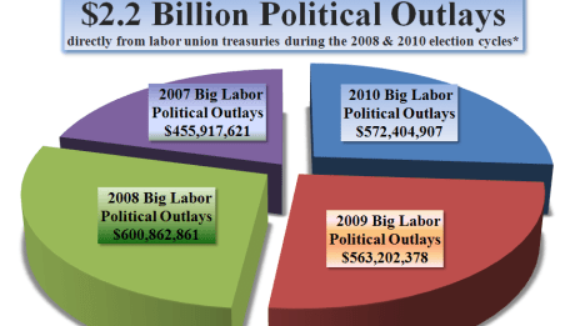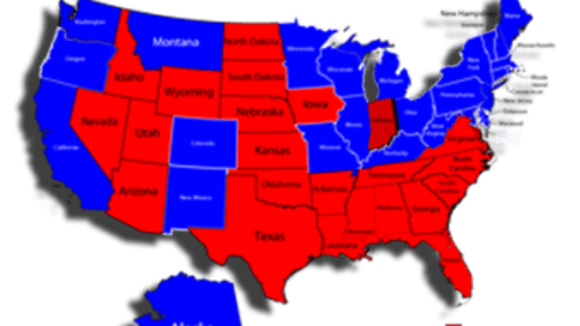It’s ‘Labor’ Day, Not ‘Union’ Day
National Right to Work President Mark Mix makes the critical distinction between "Labor Day" and "Union Day," a distinction that union bosses chose to ignore: By Mark Mix Most Americans realize that Labor Day is about celebrating workers, not union bosses, but that won’t stop Big Labor’s apologists from stealing to spotlight to demand more power. The fact is that modern unions are built on the legal privilege of compulsion. In 28 states without Right to Work laws, nonunion employees can be fired for refusing to pay union dues. Millions more nonunion workers have no choice but to accept union bargaining over their wages and working conditions. What’s more, union officials routinely funnel nonunion workers’ dues into political campaigns aimed at defending or expanding their already extensive special privileges. As legislators from Wisconsin to Ohio can attest, this perverse cycle has made it extremely difficult to roll back union bosses’ workplace powers. Big Labor thrives on a system of government-granted special privileges. But what do workers get out of this arrangement? According to union apologists, they’d be helpless without it. But the facts reveal a different story. Compulsory unionism makes union bosses unaccountable to rank-and-file workers, whose financial support is absolutely mandatory. After all, why should union officials bother with the hard work of representing employees if they’re sitting on a forced-dues revenue stream guaranteed by the government?

Big Labor and Barack Obama Expected to Spend a Combined $2 Billion in 2012 Election Cycle
According to Reuters, President Obama “is expected to raise $1 billion, which is unprecedented in U.S. politics” for his re-election campaign. Based on the National Institute of Labor Relations Research (NILRR.org), Big Labor has average spending $1.1…
US Labor Secretary Bills Taxpayers for Her New SUV... Made In Canada
From Dr. Perry’s Carpe Diem blog: In the video above, President Obama’s Labor Secretary, Hilda Solis, explains why she recently bought a new Chevy Equinox: “What better example could I set if I…

Time for Kentucky to Get Right to Work
Enacting a Right to Work law in Kentucky would be a boon for jobs and economic prosperity -- but don't just take our word for it. The Bowling Green Daily News agrees: Gov. Steve Beshear and the Democrat-controlled House are beholden to labor unions in this state and for that reason, year after year we continue to lose companies and jobs to other Southern states because Kentucky is not a right-to-work state. Right-to-work laws protect workers’ freedoms by not forcing them to pay dues to a union upon becoming employed or throughout employment. Nearly any citizen in a right-to-work state is protected by a state’s right-to-work law. Labor unions make up less than 9 percent of Kentucky’s workforce, so it would make sense that Beshear and the House would have more concern for the majority of the workforce. Sadly, they don’t. They need the unions, who contribute millions of dollars every election year through political action committees or other ways to encourage the governor and those in the House to follow part of their agenda, which is not allowing Kentucky to become a right-to-work state. Kentucky is the only Southern state not to have a right-to-work law. For that reason, many companies don’t even consider our state when choosing plant locations. Business 101 would tell you that this is simply bad business. The governor and House are hindering our state because they ignore reality. Shame on them. It reflects poor leadership and it holds our state back when competing for jobs that could be coming to Kentucky. Simpson County Judge-Executive Jim Henderson is a strong supporter of the right-to-work concept. Henderson said on a number of occasions during the process of trying to get a company to come to Franklin, it was eliminated because of not being a right-to-work state. He said it was communicated through correspondence and other means of communication that not having a right-to-work law is why companies aren’t coming to his city.One only has to look at companies such as Nissan North America. The company admitted that one reason it decided to move its headquarters from California to Tennessee and not Kentucky was because of the lower business costs. Interestingly enough, the average Kentuckian has to work 13 months to make what an average Tennessean can in one year.
No Marching for GOP
If you are a Republican in Wisconsin you will not be allowed to march in the Labor Day parade in Wausau, according to WAOW. The desperation level with labor union activists in the Badger State is off the charts but…
Trumka "Really, Really Excited" to Raise Taxes With European Socialsts
Big Labor’s AFL-CIO President Richard Trumka has visited the White House over 30 times, appears in Administration web pages, and works with the the President of the Party of European Socialist Poul Nyrup Rassmusen to add new taxes on all…
Trumka "Really, Really Excited" to Raise Taxes With European Socialsts
Big Labor’s AFL-CIO President Richard Trumka has visited the White House over 30 times, appears in Administration web pages, and works with the the President of the Party of European Socialist Poul Nyrup Rassmusen to add new taxes on all…
President Obama and President Trumka
The president celebrated Labor Day with AFL-CIO boss Trumka this year, leaving the 93% of private sector workers who are not members of a union with part of the tab. Obama and his Secretary of [Big] Labor, Hilda Solis, participated in an…